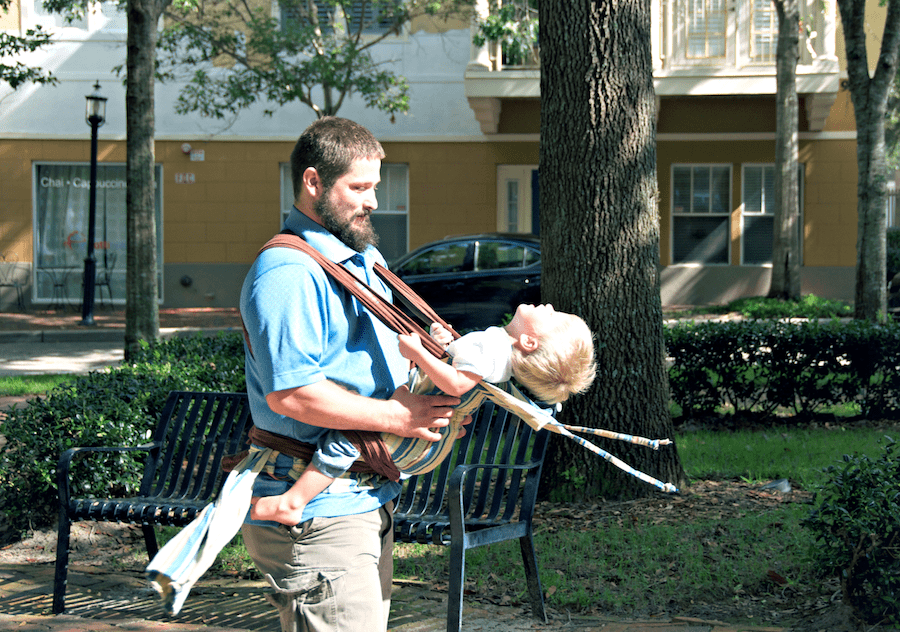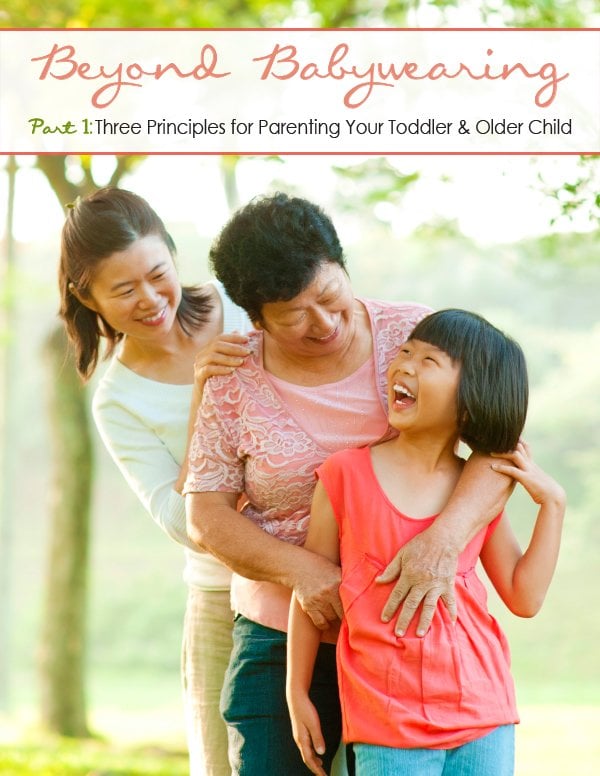The Continuum Concept and Modern Day Attachment Parenting
Do you wear your baby? Nurse your toddler? Sleep in a family bed?
If you do, chances are you’ve been influenced by an obscure little book penned nearly four decades ago.
The Continuum Concept
Many of today’s attachment parenting principles were first brought to the attention of Western cultures through a slender volume titled The Continuum Concept: In Search of Happiness Lost. Its author, the late Jean Liedloff, spent two and a half years living with a Stone Age South American tribe, observing them and recording their way of life.
The Yequana Indians were unlike any people Liedloff had ever encountered. They seemed universally happy and fulfilled. Their children, especially, were remarkably calm and independent. In the entire time she stayed with them, she witnessed no sibling rivalry, no whining, and almost no crying, fussing, or tantrums amongst their infants and small children.
She was amazed to see older children and teens confidently performing difficult tasks and making mature decisions. All without the defiance or recalcitrance so common in Western adolescents.
In her own words: “Amazingly, the children never fought. They played together all day unsupervised, all ages, from crawling, to walking to adolescence. Not only did they not fight, they never even argued. This is not at all what we have been taught human nature is…”
The Power of Sequential Social Developmental Experiences
Liedloff observed that in this culture, and as in many other indigenous societies around the globe, children were treated very differently than in Western cultures. She began to develop a theory of human social development based on her observations.
According to her, every human being is born with an inborn expectation to undergo certain natural social experiences. These begin with being held immediately after birth, and an extended in-arms phase in early infancy.
Liedloff called her theory the Continuum Concept, because she maintained that these experiences should come sequentially (in a continuum), and are necessary for the sustainable continuation of our species. Missing one or more of them, according to Liedloff, can cause an individual to have trouble integrating properly into society. And by extension, one would assume that a society that does not routinely provide these experiences to its members is likely to, eventually, break down.
Attachment Parenting and Continuum Practices
You may be familiar with many of these Continuum practices as the basic principles of the Attachment Parenting (AP) movement. Or you may have heard of celebrities like Mayim Bialik who practice Attachment Parenting.
Several, like baby wearing, extended nursing, and co-sleeping are, if not wholly embraced by Western society, at least becoming better known and more accepted. However, most Western parents who follow these practices agree that their families are still far from experiencing the ideal of human contentedness that Liedloff describes in her book.
Assuming that Liedloff’s observations are accurate, how can we continue to improve upon our parenting practices? In other words, once the honeymoon of infancy is over, what then?
In examining The Continuum Concept (and related materials included on the book’s website) for hints on parenting children ages toddler and beyond, three main principles spring forth as very different from the way most of us were raised, and continue to raise our children:
The 1st Principle of the Continuum Concept: Have profound trust in the child.
Caregivers in continuum societies understand that the child is an inherently “good citizen”. And that they have an innate desire to please and an inborn sense of self-preservation.
“Nobody’s born rotten,” says Liedloff. “You just don’t have bad kids. There is no such thing. But we can make them bad. Ironically, the reason it’s possible is because we are so social as a society. Our social nature is such that we tend to meet the expectations of our elders. Whenever this reversal took place and our elders stopped expecting us to be social and expected us to be anti-social, or greedy or selfish or dirty or destructive or self-destructive is when the real fall took place. And we’re paying for it dearly.”
Instead of warning the child to behave and laying out consequences for bad behavior, Liedloff advocates simply modeling the “good” behavior, and expecting the child to follow suit. If the child errs, he should be gently instructed to change his behavior, but he should never be judged negatively as a person because of his mistakes.
The 2nd Principle of the Continuum Concept: A child should not be the center of attention.
Neither, however, should he be excluded from adult society. In Yequana society, Liedloff observed that adults were available to the child as needed. And that they focused primarily on their own activities, not on their role as parents. This approach lets the child learn by direct observation and to begin participating in adult activities as he is ready, without the pressure of being in the spotlight.
Of course, this does not mean that you should never pay attention to or play with your child. It simply, in Liedloff’s words, “reflects an understanding of the child’s role as a learner in society.”
The child needs a mother who is confident and calm. The child needs a mother who knows what to do, and doesn’t ask permission from her child. If you’re pleading with her (or asking her to lead), then she’s got the power, and it makes her nervous because it means you’re not sure of yourself, and you’re begging her for acceptance (or direction). Any grown-up lady that pleads with a four year old is not to be relied on.
Rather than following the child’s lead, Liedloff suggests telling her nicely but matter of factly what you expect her to do, without asking her permission or regaling her with choices or reasons. In other words, instead of saying, “Let’s go have some lunch now, OK? What would you like to eat?” tell your child “OK, now it’s time for lunch. Can you find the spoons? We’re going to have soup.”
Keep in mind, though, that taking the lead is not the same thing as taking control over your child. The parents Liedloff observed never forced a child to do chores. They simply modeled the behavior, and made sure the tools – like a child-sized grater – were available to the child.
The 3rd Principle of the Continuum Concept: A healthy human experience must include interaction between people of many different ages.
In a society which divides its tribes into isolated nuclear families, where adults must often work outside the home, where children are not typically welcomed into the workplace, and where, from preschool to nursing home, our age segregation practices border on the extreme, is it even possible to offer our children – and ourselves – the experiences we apparently need to become truly fulfilled human beings?
Perhaps not to the extent that the Yequana could. But just as many Western parents have resurrected the practices of babywearing and co-sleeping, why not reclaim the tribal experience as well?



